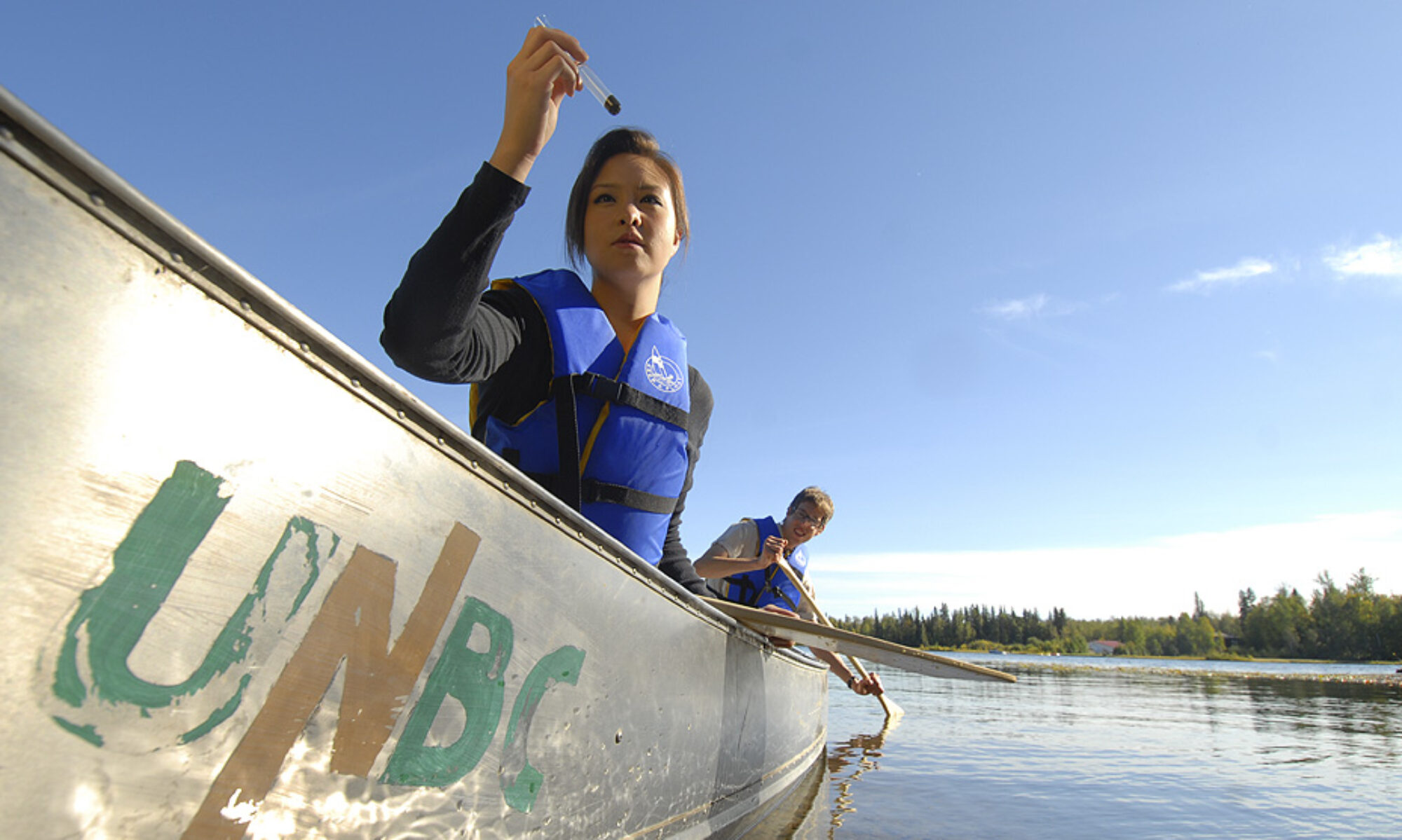Making Research Accessible with a “Fun” gi – Special Guest Dr. Hugues Massicotte
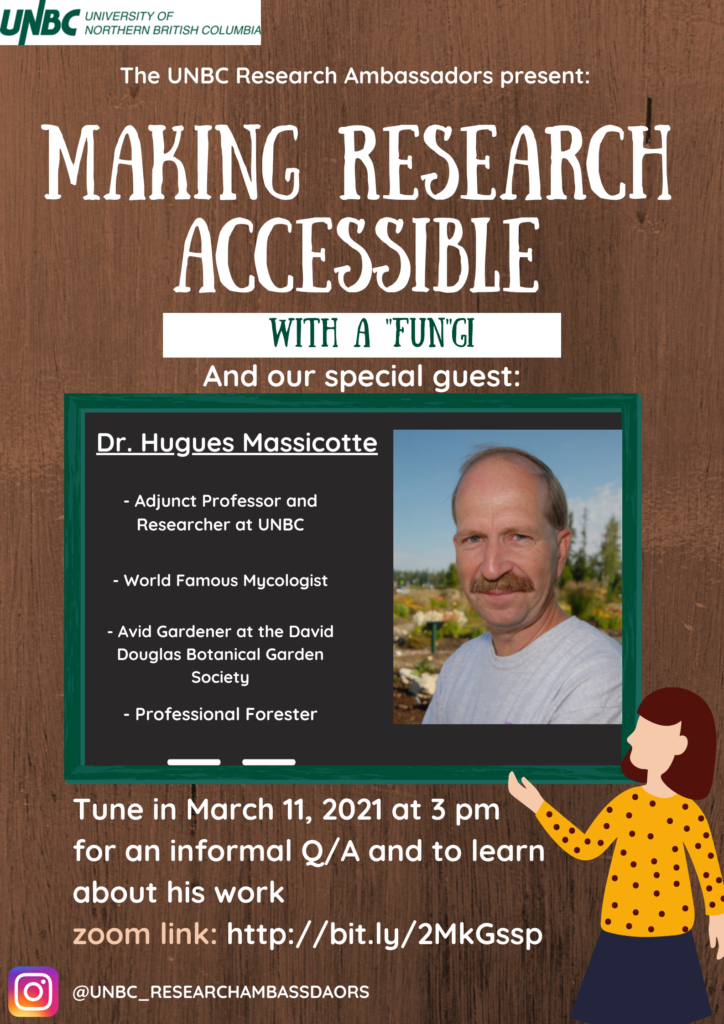
See the full recording here ——–
Making Research Accessible for Seniors with Dr. Shannon Freeman
Making Research Accessible for Seniors
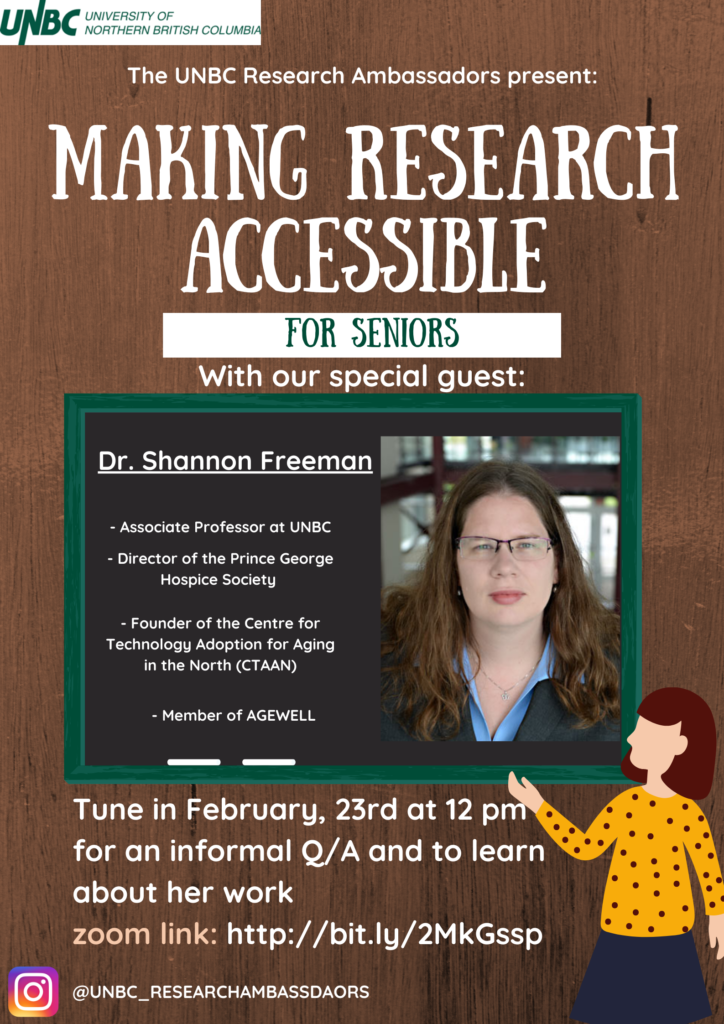
Rant with the RAs
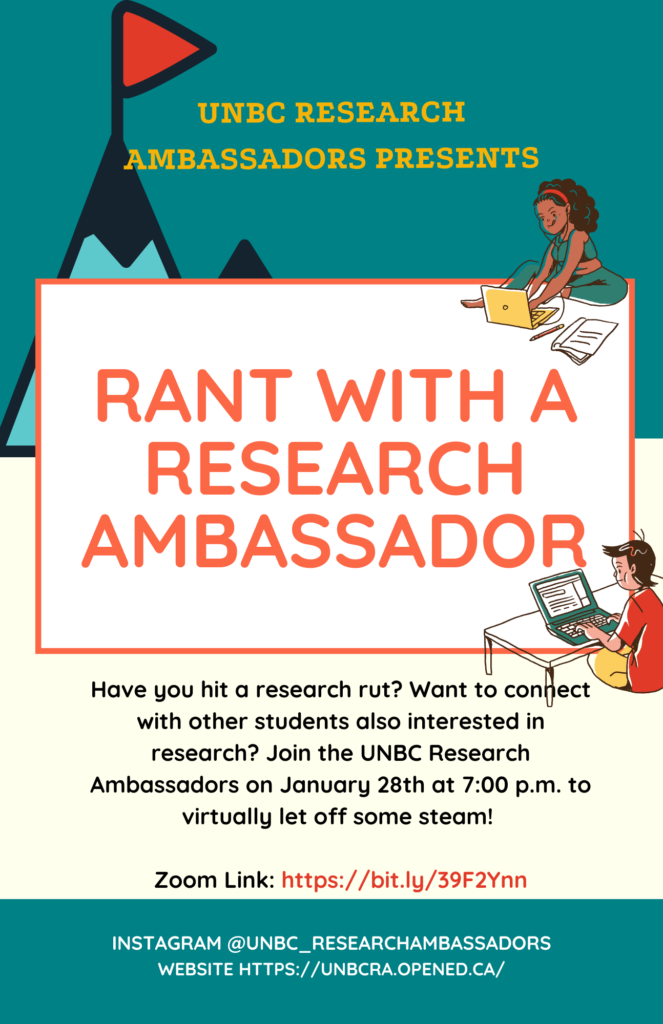
Research Your Way to Success Session 4 – Doing Research Remotely
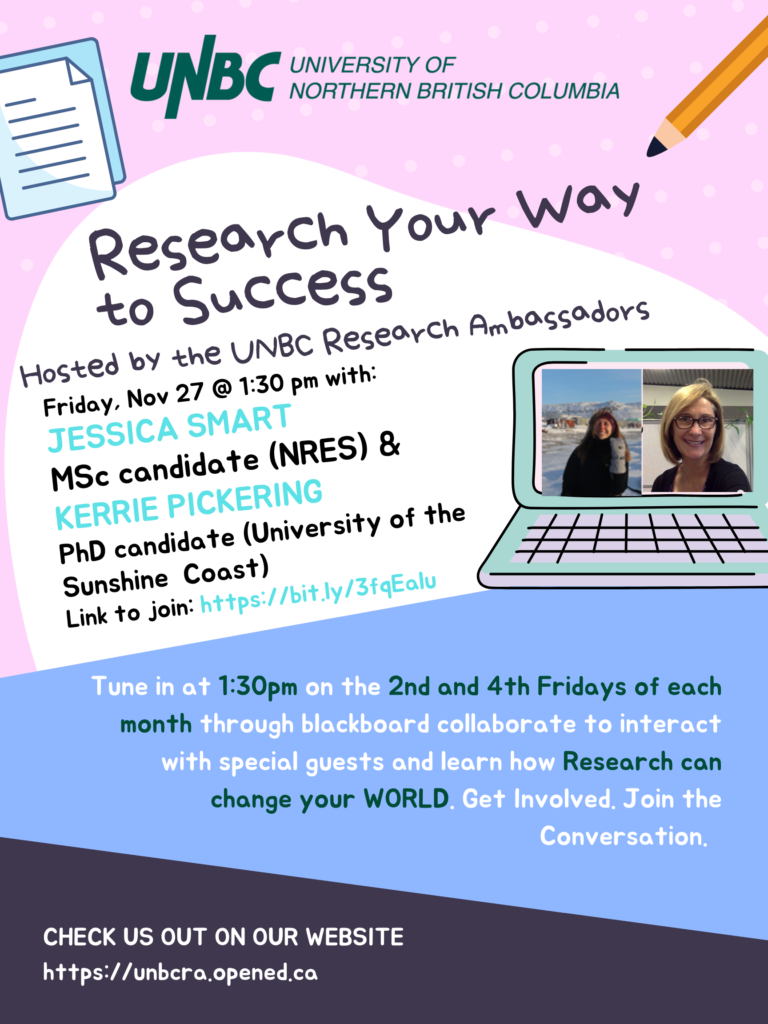
About the Presenters
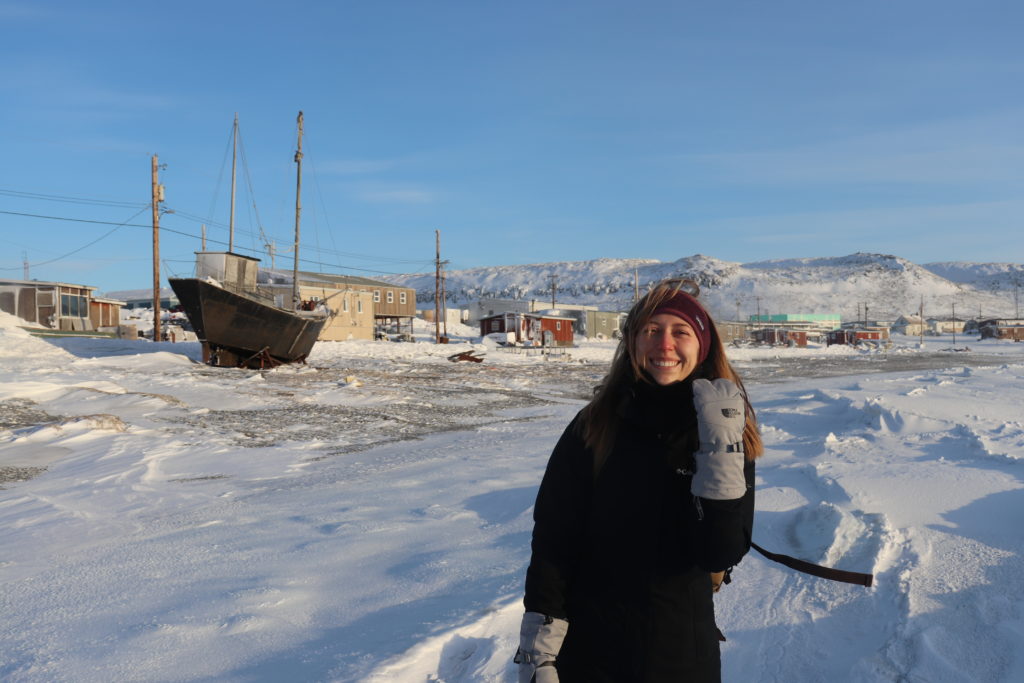
Jessica Smart is a graduate student in the Natural Resources & Environmental Studies program at UNBC working under the supervision of Dr. Tristan Pearce. Her graduate work is interested in co-producing knowledge among Inuit and scientists to better understand recent changes observed in Arctic char in the Western Canadian Arctic. In this presentation, she will discuss her research journey from her undergraduate experiences to what led her into Arctic research. Jess will touch on some challenges posed by COVID-19 and how it has impacted her ability to conduct community-led, interactive research.

Kerrie Pickering explores the intersection between health and the environment. As a PhD candidate at the University of the Sunshine Coast, Australia Kerrie’s research PhD examines the relationship among food security and social and ecological change in Fiji. Her interest comes from an international career as an RN and having completed a BSc Environmental Studies followed by a MA Geography. Her past research has included exploring if engagement in citizen science impacts the well-being of nursing home residents; assessing the adaptive capacity of the Ontario wine industry for climate change adaptation; project management for a Niagara climate change collaborative management project; research assistantship investigating adaptive collaborative management in biosphere reserves in Canada and Sweden. As Kerrie is completing her PhD, she is beginning work with the COVID Observatories and exploring how indigenous people in Fiji are experiencing and managing food security during the covid-19 pandemic.
Using a Reference Manager
I never used a reference manager until I was in the 4th year of my undergraduate studies, and by then it was a bit too late to get rid of my old habits – almost.
Everyone who has ever been in university, regardless of subject, knows that referencing is one of the greatest nightmares that every academic experiences. Don’t get me wrong. Finding and exploring all your references is cool, but incorporating them in your work, is anything but. It’s time-consuming and tedious.
You put in 1 hour of work on an assignment, and you should expect to put an equal amount into citations, trying to sift through all the authors – and what citation style to use? APA? MLA? AMA? Acronyms get me out of here!
But does it always have to be that way? Actually no. With a citation manager, you can import journal articles, save it for later, easily cite your references in any format you wish, and then plug it directly into your references section. It’s that simple. You can even add annotations within your references so you can jot your memory about what the heck you used it for (which I have most trouble with because all the papers are so long).
Reference managers you can use can be integrated with your web browser and even with Microsoft Word, so you can work seamlessly online.
There are a couple of them out there, including Mendeley and Zotero. But please use it! It will save you lots of time and energy.
Here’s a video tutorial below on how to get started with Mendeley (the citation manager that I use). *Please note that I do not endorse any particular reference manager nor am I sponsored by Mendeley in any way – I just happen to use it. 🙂
Research Your Way to Success: Session 4
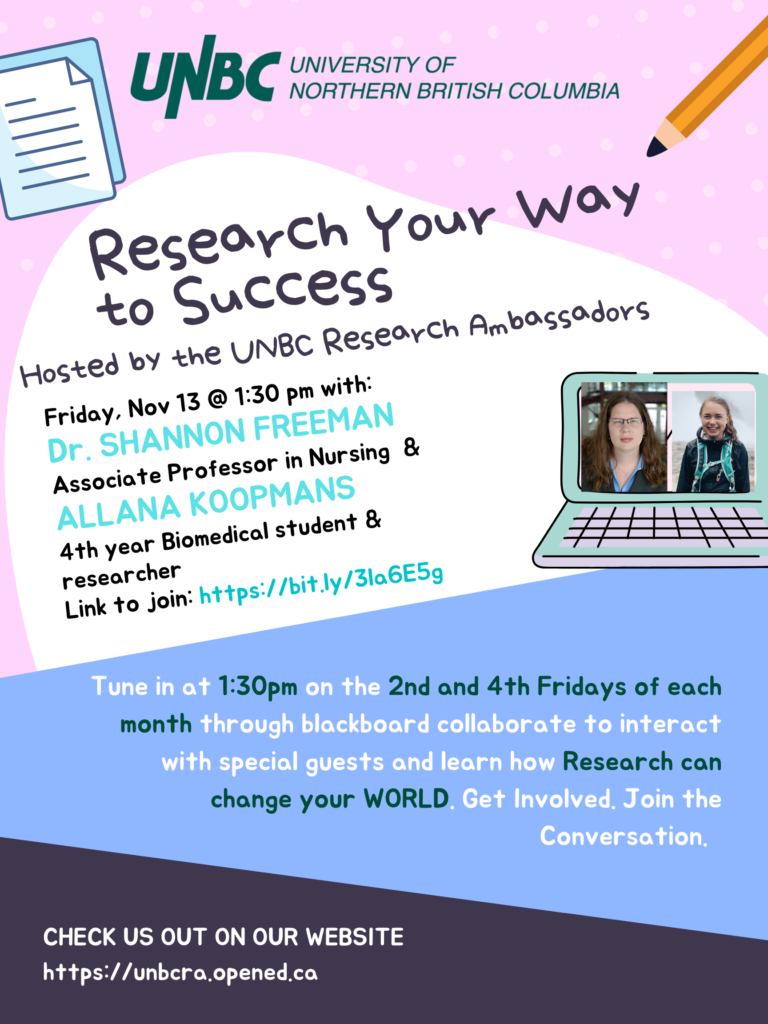
About the Presenters
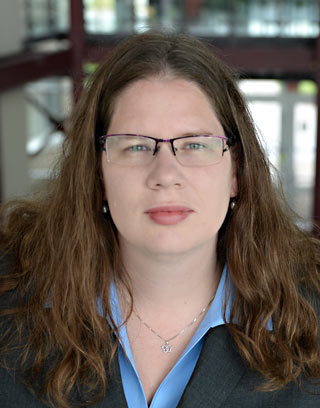
Dr. Shannon Freeman
Dr. Freeman is a member of AGEWELL: Canada’s technology and aging network focusing on innovative solutions to support healthy aging and is leading work examining clinical need for long-term care in rural and northern communities. She is working on developing a safe transition program for residents to return to community-based setting of care. This mixed methods project employs an integrated knowledge translation approach within a knowledge to action’ framework and is conducted in partnership with the Northern Health Authority. Dr. Freeman is also working on closing the gap between technology development and its implementation and sustained use, especially for older adults in rural and northern areas. To that end Dr. Freeman is establishing a Centre for Technology Adoption for Aging in the North – CTAAN – A collaborating center for innovations in technology development and implementation to support older adults in rural and northern communities, which will connect researchers and technology developers with healthcare systems decision-makers, leaders and care providers. Dr. Freeman’s work with CTAAN will focus on adapting, piloting, and implementing new and existing technology solutions tailored to address the challenges experienced by rural and northern communities Dr. Freeman also takes an active role in research focused on hospice palliative and end-of-life care and is a Director of the Prince George Hospice Society. Dr. Freeman has published 37 peer reviewed articles, co-edited a book, written 8 book chapters, and had an active role in the creation of the interRAI Palliative Care Clinical Assessment Protocols.

Alanna Koopmans
Alanna is a 4th year student majoring in Biomedical Studies in UNBC’s Bachelor of Health Sciences Honours program. Alanna’s honours thesis will be looking at the experiences of physical activity in people with Multiple Sclerosis during the COVID-19 pandemic. Alanna has worked as the Patient Engagement Coordinator on the Patient Oriented Predictive Modelling of Healthcare Utilization (POPMHU) team, supervised by Dr. Shannon Freeman (UNBC) and Dr. Piper Jackson (TRU), since March 2020. Alanna completed an Undergraduate Research Experience with the UNBC site of the Dementia Inclusive Choices for Exercise (DICE) project under the guidance of Dr. Shannon Freeman and Dr. Chelsea Pelletier in the Winter 2020 term. Alanna has research interests in physical activity, health of rural and remote communities, aging, dementia, health across the lifespan and chronic disease.
Research the North Ep. 2
Guest – Bryan Lim

Bryan Lim is a UNBC Alumni who graduated in 2019 with a Masters in Biochemistry. Originally from Malaysia, he is now settled in Vancouver, BC working as an R & D Scientist at Canadian PhytoPharmaceuticals Corp.
He is intrigued by the potential nutraceuticals and their diverse health-beneficial effects on human health and he is also a self-taught home cook with a loving passion for food in the restaurant and food catering industry. You can check his creations out on Instagram @ Bryan_Experimental Kitchen.
A Researcher’s Toolkit: Patience and Perseverance
Think Intelligence is what makes a good Researcher? To me that is only part of the equation. Patience and Perseverance are far better indicators of success in research than intelligence. Let me tell you why.
I remember first stepping into the lab as a volunteer during my first year of undergraduate studies. In my mind, it was a generic picture of inspiration and awe. I felt like I would be making a huge difference. But yet all I was doing was refilling pipette tips for 6 months. It was, to put it lightly, the most boring thing I ever imagined I would do in a lab, and yet, it was an essential task, one that allowed the lab to accomplish many amazing things. And it took me many years to realize this…but by performing those menial tasks that no one notices, it was in a sense, preparing me for the reality of doing research. It was a very important reminder that research is a lot about “the grind” and performing the same tests over and over. Remember it took 80 years of the structure of DNA to be discovered after we knew of its existence.
Despite what everyone thinks, research is not always glamorous, and to really answer those big questions, you have to grind through the smaller basic ones first – like determining which size pipette tips to use.
People often don’t talk about these behind the scenes work because it would probably take up a thousand pages in a journal, but it is just as valuable. Nor is it ever depicted on TV shows, where you often see a huge array of Erlenmeyers and fancy glassware all coloured and bubbling with promise. Many people don’t understand what goes behind a discovery, which is basically months if not years of repetitive tasks, some of which end in more mystery than clarity.
You have to have extreme patience and perseverance, and unfortunately not many young people with their short attention spans, have that. They all want to jump in, use an instrument, start building something, without accumulating the body of knowledge that can only come with repetition and experience. They want everything “now” without putting in the effort.
Fast forward 5 years later, I still use pipettes on a daily basis, and I wonder if there will ever be someone who would be willing to refill them. Nope. Still me. So for anyone doing something that seems “pointless” or “boring” such as solving those endless problem sets or writing reports in first year, just know that it is building your mental strength. Just as going to the gym builds your muscles, your brain needs building too. And though it seems hard at first to convince it to do so, you’ll thank yourself later. Trust me.
